These are the 18 best fruits to eat for diabetics now
Most health and medical professionals tell you that fruits and vegetables are the way to go for diabetics to incorporate into their diet. But not all fruits are equal with some having too much sugar and carb intake that can easily spike your blood sugar levels in no time.
To make this worthwhile, I’ve created the best fruits to eat for diabetics below that covers all the typical and some more unusual fruits that should be in your diet plans depending on availability and which ones tend to be easier to buy regularly.

Why are fresh fruits good for diabetics?
Benefits of Fresh Fruits for Diabetics
1. Nutrient-Rich
- Essential vitamins and minerals: Vitamin C, potassium, fiber
- Supports overall health: Boosts immunity, maintains bodily functions
- Antioxidants: Help manage diabetes-related complications
2. Fiber Content
- High fiber: Regulates blood sugar levels
- Slows absorption of sugar: Prevents sudden blood sugar spikes
- Improves glycemic control: Enhances overall blood sugar management
3. Natural Sugars
- Slower absorption: Compared to refined sugars
- Reduced risk of rapid spikes: Natural sugars absorbed more gradually
- Fiber aids: Further slows sugar absorption
4. Low Glycemic Index
- Low to moderate GI: Lesser impact on blood sugar levels
- Suitable for diabetics: When consumed in appropriate portions
- Maintains stable blood sugar: Helps in managing diabetes effectively
5. Hydration and Satiety
- High water content: Helps with hydration
- Contributes to fullness: Aids in weight management
- Supports diabetes care: Important aspect of diabetes management
6. Heart Health
- Improves cardiovascular health: Reduces blood pressure, lowers cholesterol levels
- Antioxidants: Protect against cardiovascular disease
- Common complication in diabetics: Reduces risk of heart-related issues
Recommendations
- Variety and balance: Incorporate a variety of fresh fruits into a balanced diet
- Monitor intake: Diabetics should monitor their fruit consumption
- Consult healthcare provider: Determine best choices and portions for individual needs
Pin and save this for later
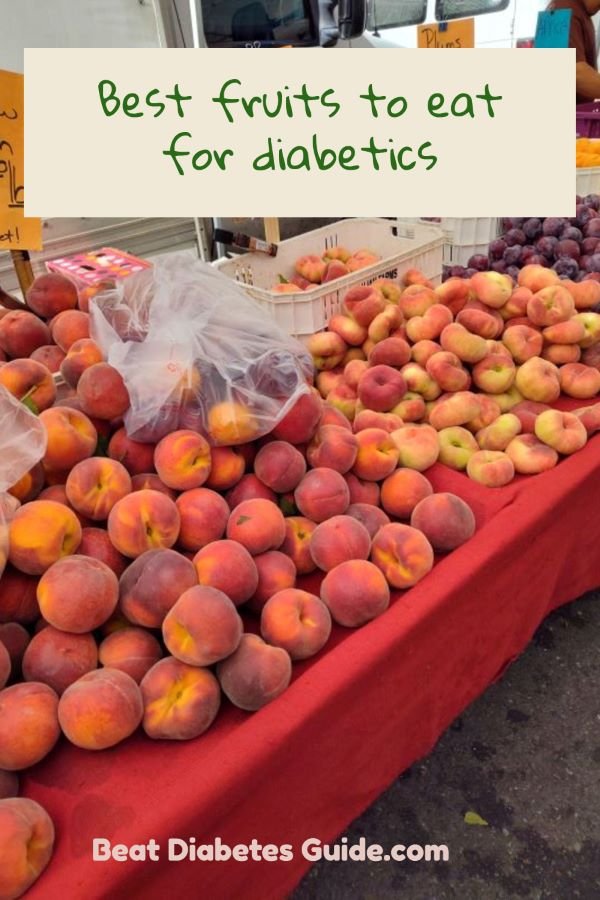
Here are the 18 best fruits to eat for diabetics
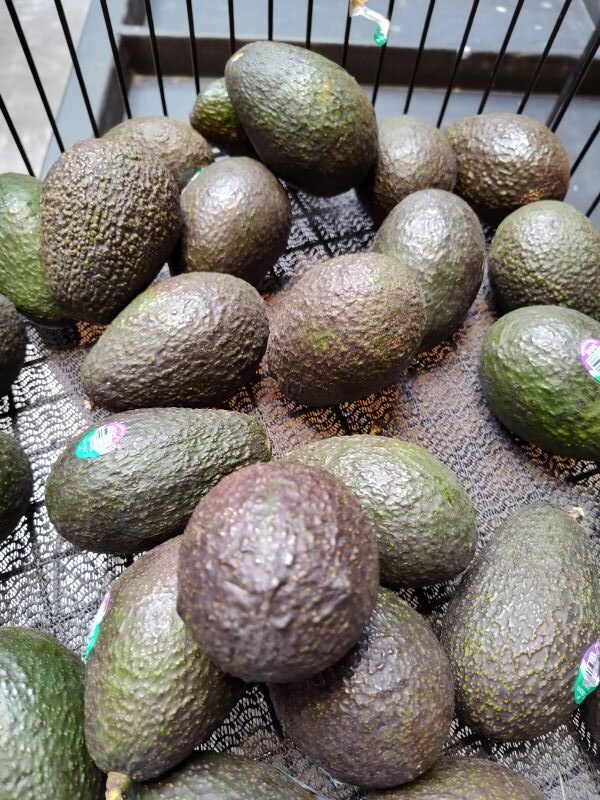
1. Avocado fruits
Avocados are advantageous for diabetics due to their low glycemic index and high content of healthy fats, which aid in stabilizing blood sugar levels. The monounsaturated fats in avocados enhance insulin sensitivity and promote heart health, essential for diabetics. Additionally, their high fiber content slows sugar absorption into the bloodstream, aiding in better blood sugar management. Packed with essential nutrients like potassium, avocados contribute to overall health and well-being.
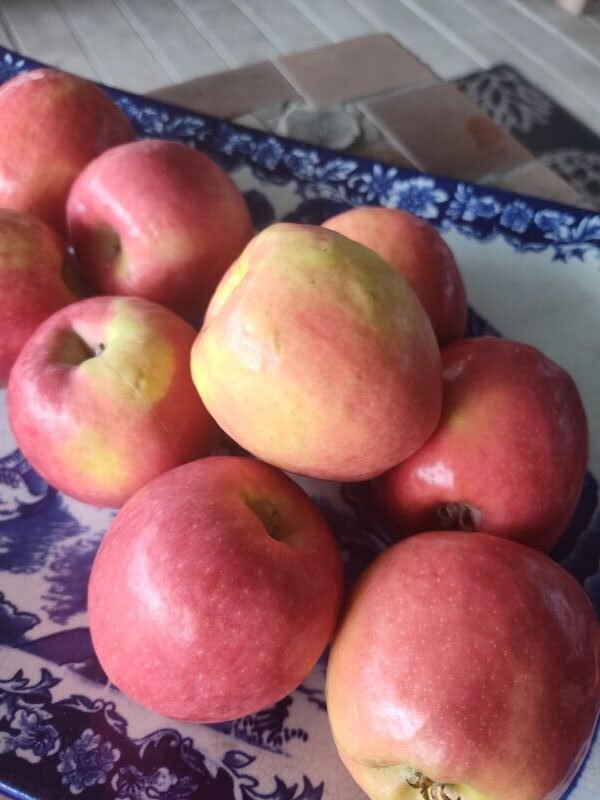
2. Apple fruits
Apples are great for diabetics because they have a low glycemic index, leading to a slower increase in blood sugar levels. Their high soluble fiber content, especially pectin, helps control blood sugar by slowing glucose absorption and improving digestion. Rich in antioxidants, vitamins, and minerals, apples support overall health and reduce the risk of diabetes-related complications. Their natural sweetness can satisfy cravings without causing significant blood sugar spikes, making them a healthy and satisfying snack for diabetics.
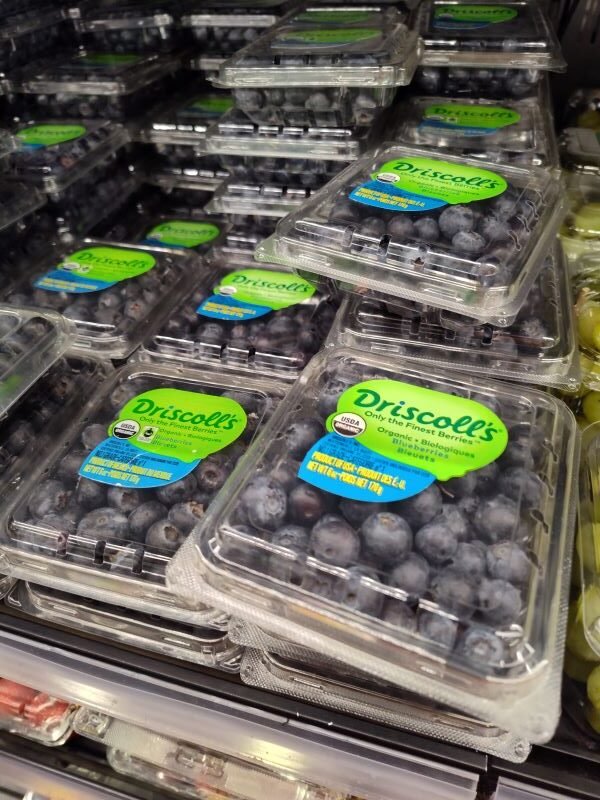
3. Blueberry fruits
Blueberries are excellent for diabetics because they have a low glycemic index and are high in fiber, which helps regulate blood sugar levels. They are packed with antioxidants, especially anthocyanins, which enhance insulin sensitivity and lower the risk of heart disease. Additionally, blueberries provide essential vitamins and minerals that support overall health. Their natural sweetness makes them a satisfying snack that doesn’t cause significant blood sugar spikes, making them a nutritious and enjoyable choice for diabetics.

4. Raspberry fruit
Raspberries are great for diabetics because they have a low glycemic index and are high in fiber, helping to keep blood sugar levels stable. They are rich in antioxidants like anthocyanins, which enhance insulin sensitivity and reduce inflammation. Additionally, raspberries provide essential vitamins and minerals such as vitamin C and manganese, supporting overall health. Their natural sweetness makes them a satisfying and healthy snack that doesn’t cause significant blood sugar spikes, making them an ideal choice for diabetics.
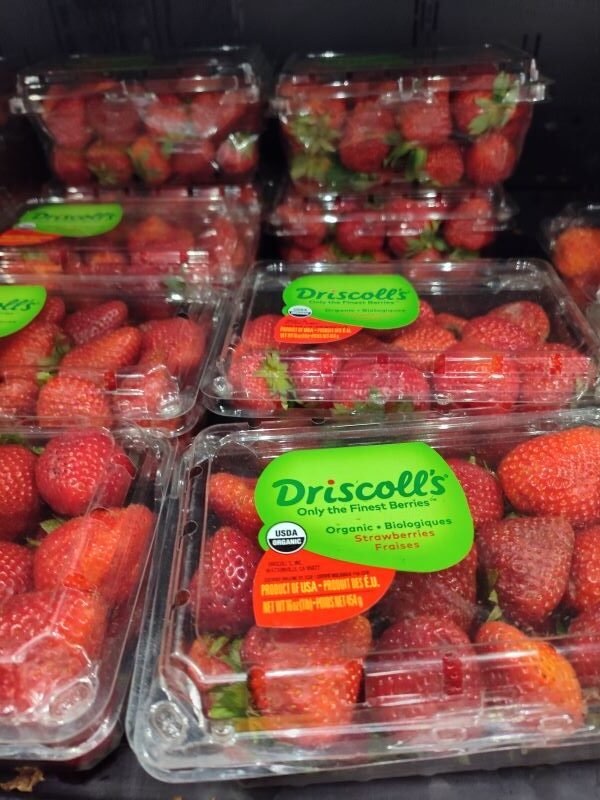
5. Strawberry fruit
Strawberries are beneficial for diabetics due to their low glycemic index and high fiber content, which help regulate blood sugar levels. They are rich in antioxidants, particularly vitamin C and anthocyanins, which can improve insulin sensitivity and reduce inflammation. Strawberries also provide essential vitamins and minerals that support overall health. Their natural sweetness offers a delicious and healthy snack option that doesn’t cause significant blood sugar spikes, making them an excellent choice for diabetics.
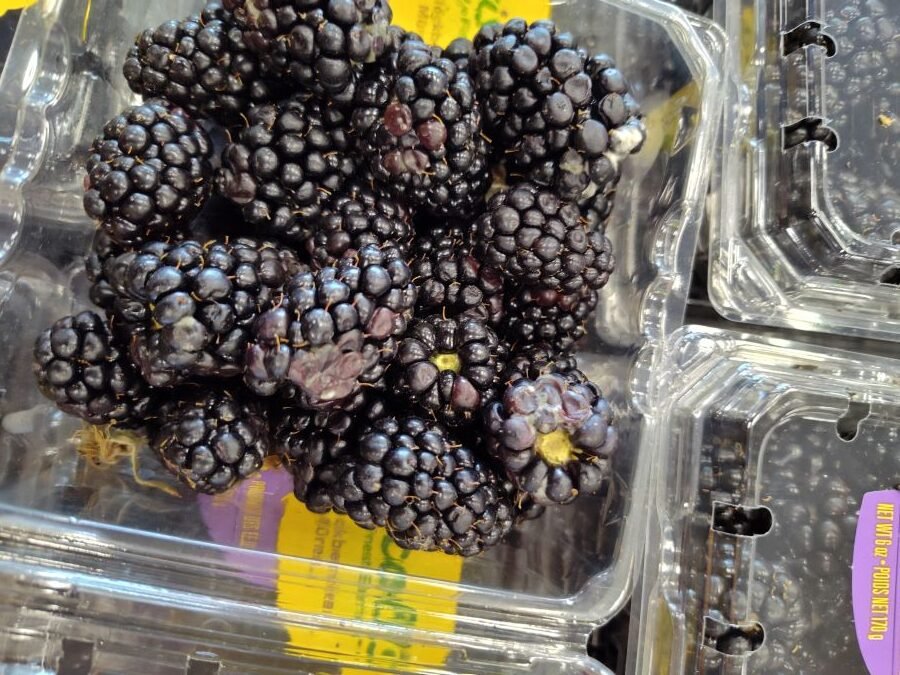
6. Blackberry fruit
Incorporating blackberries into a balanced diet, while monitoring overall carbohydrate intake, can be a delicious and healthy way to manage diabetes.
Eating blackberries can be particularly beneficial for diabetics due to several reasons:
Low Glycemic Index
Blackberries have a low glycemic index (GI) of around 25, meaning they have a minimal impact on blood sugar levels. This makes them a safe fruit option for diabetics.
High Fiber Content
Blackberries are rich in dietary fiber, which helps regulate blood sugar levels by slowing down the absorption of sugar into the bloodstream. This can help prevent spikes in blood sugar levels.
Rich in Antioxidants
These berries are packed with antioxidants like vitamin C, anthocyanins, and ellagic acid. Antioxidants help reduce oxidative stress and inflammation, which are often higher in diabetics.
Nutrient-Dense
Blackberries are a good source of vitamins and minerals such as vitamin K, vitamin C, manganese, and folate. These nutrients contribute to overall health and can help manage diabetes-related complications.
Low in Calories and Carbohydrates
With relatively low calorie and carbohydrate content, blackberries are a healthy snack option that won’t significantly impact daily caloric or carbohydrate intake.
Potential to Improve Insulin Sensitivity
Some studies suggest that the polyphenols in blackberries may help improve insulin sensitivity, making it easier for the body to manage blood sugar levels.
Hydration and Satiety
High water content in blackberries helps keep you hydrated and can promote a feeling of fullness, which may aid in weight management, an important aspect of diabetes control.
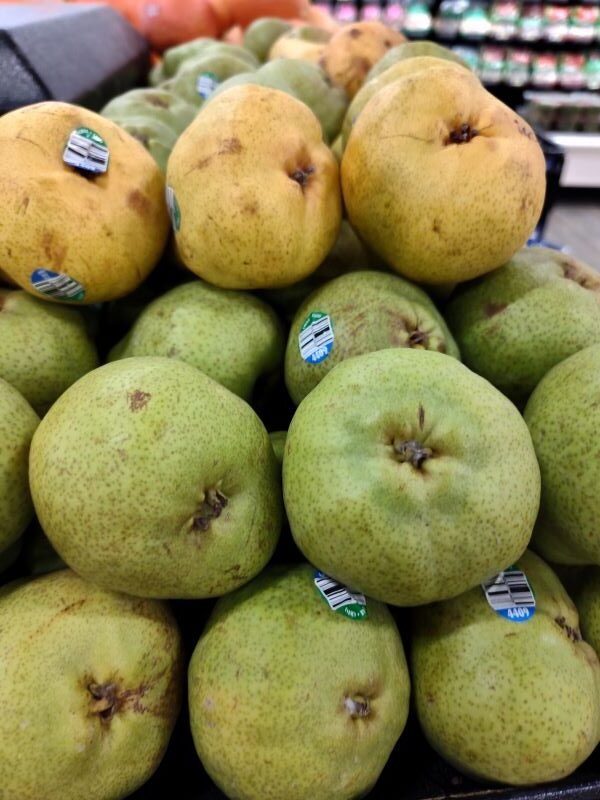
7. Pear fruit
Pears are versatile and can be eaten fresh, added to salads, or used in various recipes. They can be a delicious and healthy addition to a balanced diet for diabetics.
Incorporating pears into a balanced diet, while monitoring overall carbohydrate intake, can be a delicious and healthy way to manage diabetes.
Eating pears can be beneficial for diabetics for several reasons:
Low Glycemic Index
Pears have a low glycemic index (GI) of around 38, which means they have a gradual effect on blood sugar levels. This makes them a safe fruit choice for diabetics.
High Fiber Content
Pears are high in dietary fiber, especially in the skin. Fiber helps slow down the absorption of sugar into the bloodstream, preventing spikes in blood sugar levels and promoting better blood sugar control.
Rich in Nutrients
Pears are a good source of essential nutrients such as vitamin C, vitamin K, potassium, and copper. These nutrients contribute to overall health and can help manage diabetes-related complications.
Antioxidant Properties
Pears contain antioxidants, including flavonoids and polyphenols, which help reduce oxidative stress and inflammation. This is particularly beneficial for diabetics, as they often experience higher levels of oxidative stress.
Low in Calories
Pears are relatively low in calories, making them a healthy snack option that can help with weight management, an important aspect of diabetes control.
Hydration and Satiety
Pears have a high water content, which helps keep you hydrated and can promote a feeling of fullness. This can aid in weight management and prevent overeating.
Potential to Improve Digestive Health
The fiber in pears supports digestive health by promoting regular bowel movements and preventing constipation. A healthy digestive system can contribute to overall well-being and better diabetes management.
Pears are versatile and can be eaten fresh, added to salads, or used in various recipes. They can be a delicious and healthy addition to a balanced diet for diabetics.
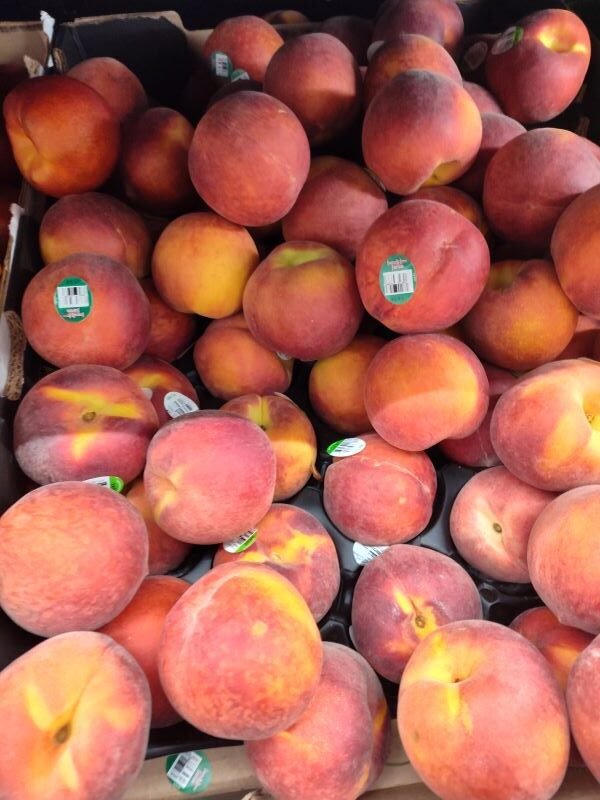
8. Peach fruit
Incorporating peaches into a balanced diet, while monitoring overall carbohydrate intake, can be a delicious and healthy way to manage diabetes.
Peaches can be a good fruit choice for diabetics for several reasons:
Moderate Glycemic Index
Peaches have a moderate glycemic index (GI) of about 42, meaning they have a relatively low impact on blood sugar levels. This makes them a suitable fruit option for diabetics when consumed in moderation.
High Fiber Content
Peaches are a good source of dietary fiber, which helps slow the absorption of sugar into the bloodstream. This can help prevent spikes in blood sugar levels and improve overall glycemic control.
Rich in Vitamins and Minerals
Peaches are packed with essential nutrients such as vitamins A and C, potassium, and magnesium. These nutrients support overall health and can help manage diabetes-related complications.
Antioxidant Properties
Peaches contain antioxidants, including vitamin C and polyphenols, which help reduce oxidative stress and inflammation. This is beneficial for diabetics, who often experience higher levels of oxidative stress.
Low in Calories
Peaches are relatively low in calories, making them a healthy snack option that can aid in weight management. Maintaining a healthy weight is important for diabetes control.
Hydration and Satiety
Peaches have high water content, which helps keep you hydrated and promotes a feeling of fullness. This can prevent overeating and support weight management.
Potential to Improve Heart Health
The nutrients in peaches, such as potassium and antioxidants, can support heart health by helping to regulate blood pressure and reduce the risk of cardiovascular complications, which are common in diabetics.
Natural Sweetness
Peaches offer a naturally sweet flavor, which can satisfy cravings for sweets without the need for added sugars. This can help diabetics manage their sweet tooth in a healthier way.
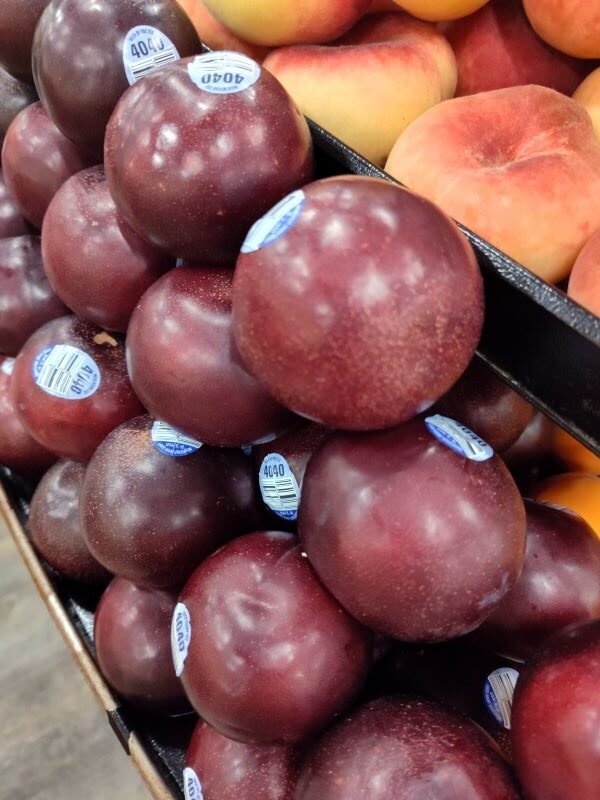
9. Plum fruit
Incorporating plums into a balanced diet, while monitoring overall carbohydrate intake, can be a delicious and healthy way to manage diabetes.
Plums can be a beneficial fruit for diabetics for several reasons:
Low to Moderate Glycemic Index
Plums have a low to moderate glycemic index (GI) of around 40-53, depending on the variety. This means they have a relatively mild effect on blood sugar levels, making them a suitable choice for diabetics when consumed in moderation.
High Fiber Content
Plums are rich in dietary fiber, particularly in their skin. Fiber helps slow down the absorption of sugar into the bloodstream, which can help prevent spikes in blood sugar levels and improve overall glycemic control.
Rich in Vitamins and Minerals
Plums are packed with essential nutrients such as vitamins A, C, and K, as well as potassium and manganese. These nutrients support overall health and can help manage diabetes-related complications.
Antioxidant Properties
Plums contain antioxidants, including phenolic compounds and vitamin C, which help reduce oxidative stress and inflammation. This is especially beneficial for diabetics, as they often experience higher levels of oxidative stress.
Low in Calories
Plums are relatively low in calories, making them a healthy snack option that can aid in weight management. Maintaining a healthy weight is important for managing diabetes effectively.
Hydration and Satiety
Plums have a high water content, which helps keep you hydrated and promotes a feeling of fullness. This can aid in weight management and prevent overeating.
Potential to Improve Digestive Health
The fiber in plums supports digestive health by promoting regular bowel movements and preventing constipation. A healthy digestive system can contribute to overall well-being and better diabetes management.
Natural Sweetness
Plums offer a naturally sweet flavor, which can satisfy cravings for sweets without the need for added sugars. This can help diabetics manage their sweet tooth in a healthier way.
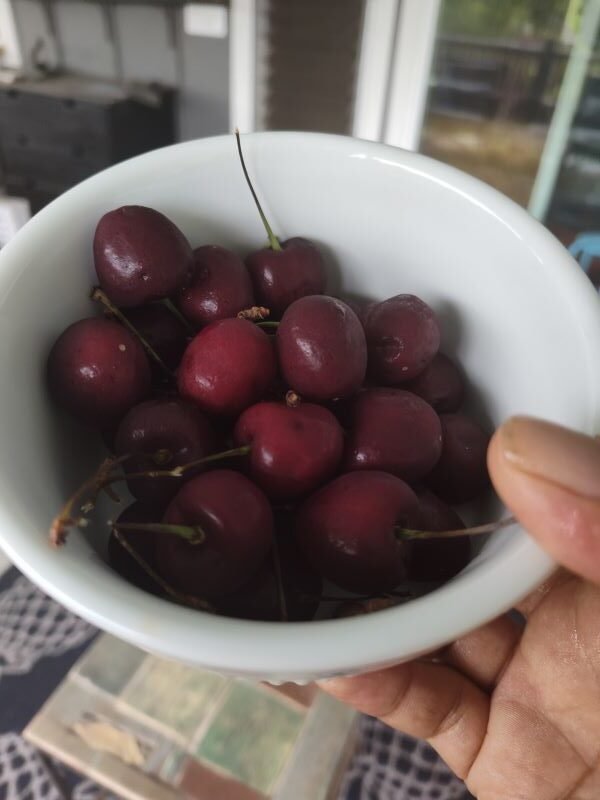
10. Cherry fruit
Incorporating cherries into a balanced diet, while monitoring overall carbohydrate intake, can be a delicious and healthy way to manage diabetes.
Cherries can be a good fruit choice for diabetics for several reasons:
Low Glycemic Index
Cherries have a low glycemic index (GI) of about 22, meaning they have a minimal impact on blood sugar levels. This makes them a safe fruit option for diabetics when consumed in moderation.
High Fiber Content
Cherries are rich in dietary fiber, which helps slow down the absorption of sugar into the bloodstream. This can help prevent spikes in blood sugar levels and improve overall glycemic control.
Rich in Antioxidants
Cherries contain powerful antioxidants, including anthocyanins and vitamin C. These antioxidants help reduce oxidative stress and inflammation, which are often elevated in diabetics.
Anti-Inflammatory Properties
The anthocyanins in cherries have anti-inflammatory properties that can help reduce the risk of diabetes-related complications, such as heart disease and neuropathy.
Low in Calories
Cherries are relatively low in calories, making them a healthy snack option that can aid in weight management. Maintaining a healthy weight is important for managing diabetes effectively.
Hydration and Satiety
Cherries have a high water content, which helps keep you hydrated and promotes a feeling of fullness. This can aid in weight management and prevent overeating.
Potential to Improve Heart Health
The potassium and antioxidants in cherries can support heart health by helping to regulate blood pressure and reduce the risk of cardiovascular issues, which are common in diabetics.
Natural Sweetness
Cherries offer a naturally sweet flavor, which can satisfy cravings for sweets without the need for added sugars. This can help diabetics manage their sweet tooth in a healthier way.
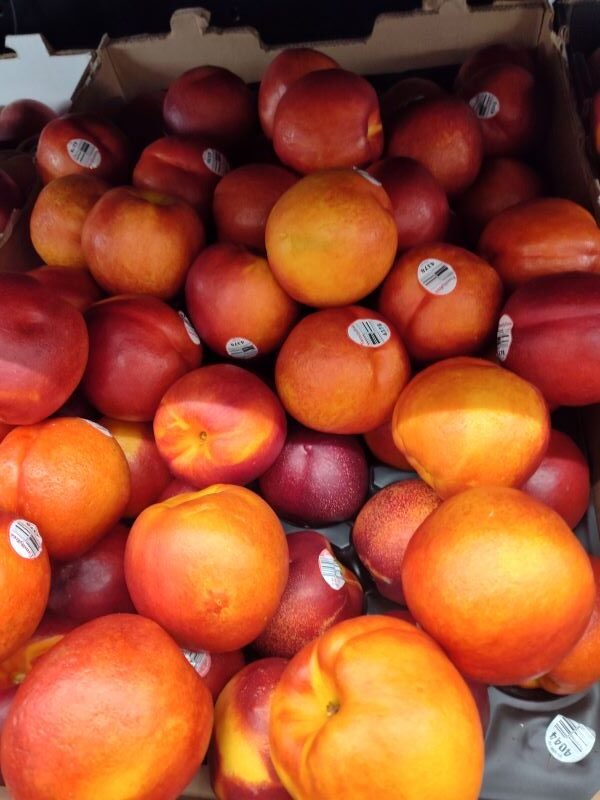
11. Nectarine fruit
Incorporating nectarines into a balanced diet, while monitoring overall carbohydrate intake, can be a delicious and healthy way to manage diabetes.
Nectarines can be a beneficial fruit for diabetics for several reasons:
Low to Moderate Glycemic Index
Nectarines have a low to moderate glycemic index (GI) of around 43. This means they have a relatively mild impact on blood sugar levels, making them a suitable choice for diabetics when consumed in moderation.
High Fiber Content
Nectarines are a good source of dietary fiber, which helps slow down the absorption of sugar into the bloodstream. This can help prevent spikes in blood sugar levels and improve overall glycemic control.
Rich in Vitamins and Minerals
Nectarines are packed with essential nutrients such as vitamins A and C, potassium, and magnesium. These nutrients support overall health and can help manage diabetes-related complications.
Antioxidant Properties
Nectarines contain antioxidants, including beta-carotene and vitamin C, which help reduce oxidative stress and inflammation. This is particularly beneficial for diabetics, who often experience higher levels of oxidative stress.
Low in Calories
Nectarines are relatively low in calories, making them a healthy snack option that can aid in weight management. Maintaining a healthy weight is important for managing diabetes effectively.
Hydration and Satiety
Nectarines have high water content, which helps keep you hydrated and promotes a feeling of fullness. This can aid in weight management and prevent overeating.
Potential Heart Health Benefits
The potassium and antioxidants in nectarines support heart health by helping to regulate blood pressure and reduce the risk of cardiovascular issues, which are common in diabetics.
Natural Sweetness
Nectarines offer natural sweetness, which can satisfy cravings for sweets without the need for added sugars. This can help diabetics manage their sweet tooth in a healthier way.
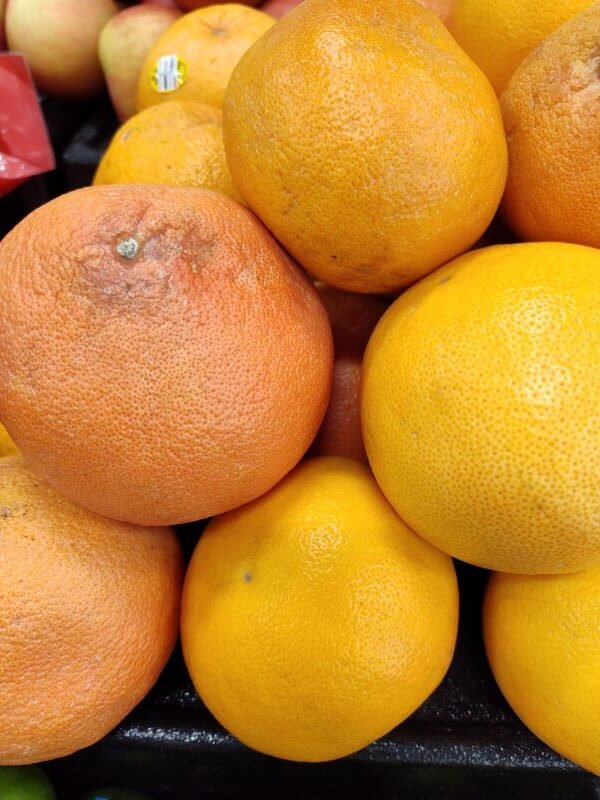
12. Grape fruit
YIncorporating grapefruit into a balanced diet, while monitoring overall carbohydrate intake and medication interactions, can be a healthy way to manage diabetes.
es, grapefruit can be a good choice for diabetics when consumed in moderation. Here are several reasons why:
Low Glycemic Index
Grapefruit has a low glycemic index (GI) of about 25, meaning it has a minimal impact on blood sugar levels. This makes it a suitable fruit option for diabetics.
High Fiber Content
Grapefruit is rich in dietary fiber, which helps slow down the absorption of sugar into the bloodstream. This can help prevent spikes in blood sugar levels and improve overall glycemic control.
Rich in Vitamins and Minerals
Grapefruit is an excellent source of vitamins A and C, potassium, and folate. These nutrients support overall health and can help manage diabetes-related complications.
Antioxidant Properties
Grapefruit contains antioxidants, such as vitamin C and flavonoids, which help reduce oxidative stress and inflammation. This is particularly beneficial for diabetics, who often experience higher levels of oxidative stress.
Low in Calories
Grapefruit is relatively low in calories, making it a healthy snack option that can aid in weight management. Maintaining a healthy weight is important for managing diabetes effectively.
Hydration and Satiety
Grapefruit has high water content, which helps keep you hydrated and promotes a feeling of fullness. This can aid in weight management and prevent overeating.
Potential to Improve Heart Health
The potassium and antioxidants in grapefruit support heart health by helping to regulate blood pressure and reduce the risk of cardiovascular issues, which are common in diabetics.
Natural Sweetness with a Tart Twist
Grapefruit offers a balance of sweetness and tartness, which can satisfy cravings for sweets without the need for added sugars. This can help diabetics manage their sweet tooth in a healthier way.
Precautions
However, it’s important to note that grapefruit can interact with certain medications, including some used to manage diabetes and heart conditions. Diabetics should consult with their healthcare provider before adding grapefruit to their diet to ensure it does not interfere with their medications.
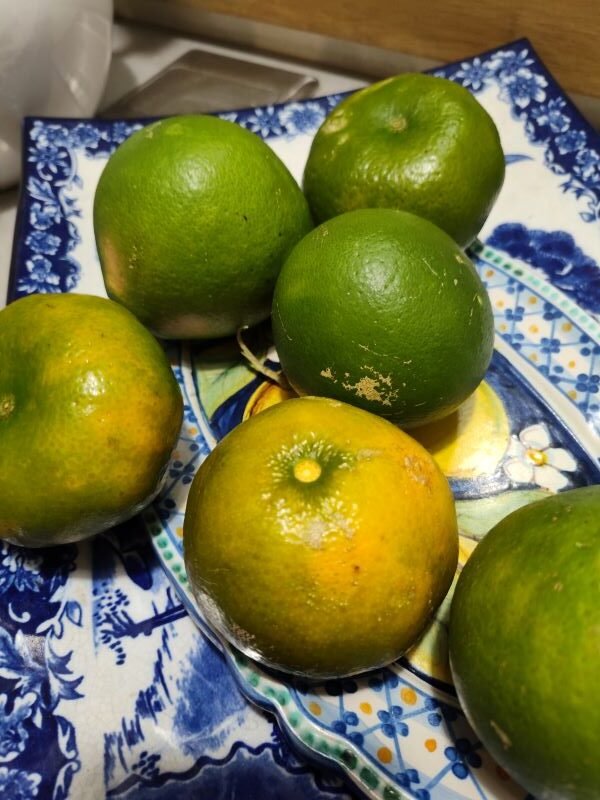
13. Orange fruit
Oranges can be a good fruit choice for diabetics for several reasons:
Low to Moderate Glycemic Index
Oranges have a low to moderate glycemic index (GI) of about 40-45, which means they have a relatively mild impact on blood sugar levels. This makes them a suitable fruit option for diabetics when consumed in moderation.
High Fiber Content
Oranges are rich in dietary fiber, particularly in the form of pectin. Fiber helps slow the absorption of sugar into the bloodstream, preventing spikes in blood sugar levels and promoting better overall glycemic control.
Rich in Vitamins and Minerals
Oranges are packed with essential nutrients such as vitamin C, folate, and potassium. These nutrients support overall health and can help manage diabetes-related complications.
Antioxidant Properties
Incorporating oranges into a balanced diet, while monitoring overall carbohydrate intake, can be a delicious and healthy way to manage diabetes. Oranges contain powerful antioxidants, including vitamin C and flavonoids. These antioxidants help reduce oxidative stress and inflammation, which are often elevated in diabetics.
Low in Calories
Oranges are relatively low in calories, making them a healthy snack option that can aid in weight management. Maintaining a healthy weight is important for managing diabetes effectively.
Hydration and Satiety
Oranges have high water content, which helps keep you hydrated and promotes a feeling of fullness. This can aid in weight management and prevent overeating.
Potential Heart Health Benefits
The potassium and antioxidants in oranges support heart health by helping to regulate blood pressure and reduce the risk of cardiovascular issues, which are common in diabetics.
Natural Sweetness
Oranges offer a naturally sweet flavor, which can satisfy cravings for sweets without the need for added sugars. This can help diabetics manage their sweet tooth in a healthier way.
Immune System Support
The high vitamin C content in oranges boosts the immune system, which is beneficial for overall health and particularly important for diabetics who may be more susceptible to infections.
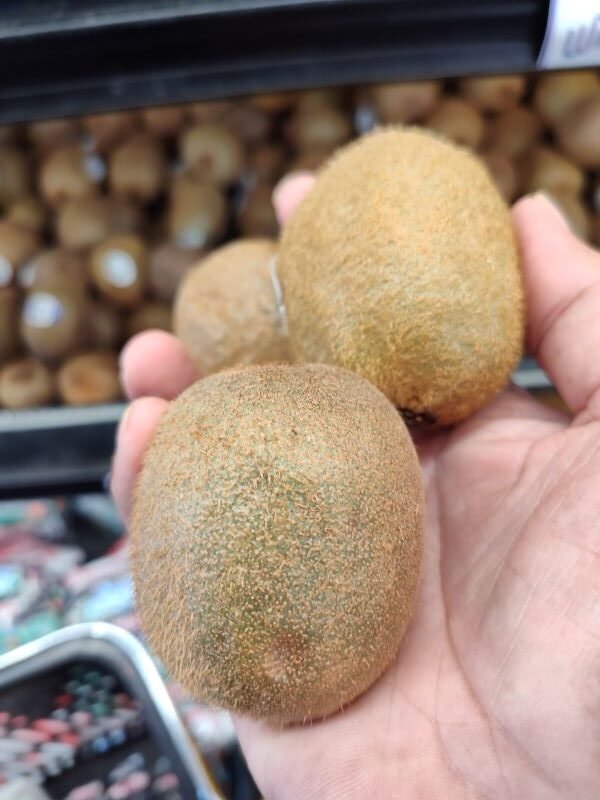
14. Kiwi fruit
Incorporating kiwi into a balanced diet, while monitoring overall carbohydrate intake, can be a delicious and healthy way to manage diabetes.
Kiwi can be a good fruit choice for diabetics for several reasons:
Low Glycemic Index
Kiwi has a low glycemic index (GI) of around 50, meaning it has a relatively mild impact on blood sugar levels. This makes it a suitable fruit option for diabetics when consumed in moderation.
High Fiber Content
Kiwi is rich in dietary fiber, which helps slow the absorption of sugar into the bloodstream. This can help prevent spikes in blood sugar levels and improve overall glycemic control.
Rich in Vitamins and Minerals
Kiwi is packed with essential nutrients such as vitamins C, E, and K, potassium, and folate. These nutrients support overall health and can help manage diabetes-related complications.
Antioxidant Properties
Kiwi contains powerful antioxidants, including vitamin C and polyphenols. These antioxidants help reduce oxidative stress and inflammation, which are often elevated in diabetics.
Low in Calories
Kiwi is relatively low in calories, making it a healthy snack option that can aid in weight management. Maintaining a healthy weight is important for managing diabetes effectively.
Hydration and Satiety
Kiwi has high water content, which helps keep you hydrated and promotes a feeling of fullness. This can aid in weight management and prevent overeating.
Potential Heart Health Benefits
The potassium and antioxidants in kiwi support heart health by helping to regulate blood pressure and reduce the risk of cardiovascular issues, which are common in diabetics.
Natural Sweetness
Kiwi offers a naturally sweet and slightly tangy flavor, which can satisfy cravings for sweets without the need for added sugars. This can help diabetics manage their sweet tooth in a healthier way.
Immune System Support
The high vitamin C content in kiwi boosts the immune system, which is beneficial for overall health and particularly important for diabetics who may be more susceptible to infections.
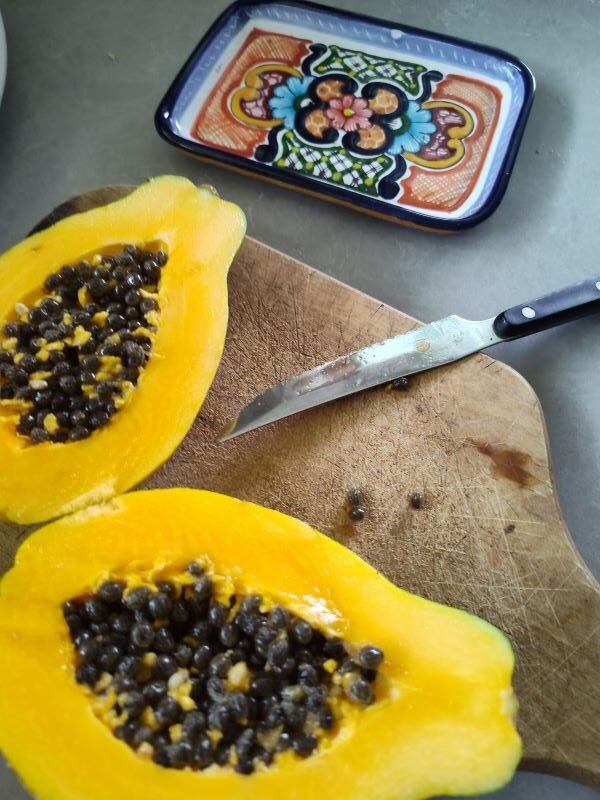
15. Papaya fruit
Yes, diabetics can eat papaya, but it’s important to do so in moderation. Here are several reasons why papaya can be a good choice for diabetics:
Low Glycemic Index
Papaya has a low to moderate glycemic index (GI) of around 60, which means it has a relatively mild effect on blood sugar levels compared to high-GI foods. However, it’s still important to watch portion sizes.
High Fiber Content
Papaya contains dietary fiber, which helps slow the absorption of sugar into the bloodstream, reducing the risk of blood sugar spikes and improving overall glycemic control.
Rich in Vitamins and Minerals
Papaya is packed with essential nutrients such as vitamin C, vitamin A, folate, and potassium. These nutrients support overall health and can help manage diabetes-related complications.
Antioxidant Properties
Papaya is rich in antioxidants, including vitamin C and beta-carotene, which help reduce oxidative stress and inflammation. This can be particularly beneficial for diabetics, who often experience higher levels of oxidative stress.
Low in Calories
Papaya is relatively low in calories, making it a healthy option for weight management. Maintaining a healthy weight is important for managing diabetes effectively.
Hydration and Satiety
Papaya has high water content, which helps keep you hydrated and can promote a feeling of fullness. This can aid in weight management and prevent overeating.
Digestive Health
Papaya contains an enzyme called papain, which aids in digestion and can help maintain a healthy digestive system. A healthy digestive system is beneficial for overall well-being and diabetes management.
Natural Sweetness
Papaya has a naturally sweet flavor, which can satisfy cravings for sweets without the need for added sugars. This can help diabetics manage their sweet tooth in a healthier way.
Portion Control
While papaya has health benefits, it’s still important for diabetics to monitor portion sizes due to its natural sugar content. Consuming it as part of a balanced diet can help manage blood sugar levels effectively.
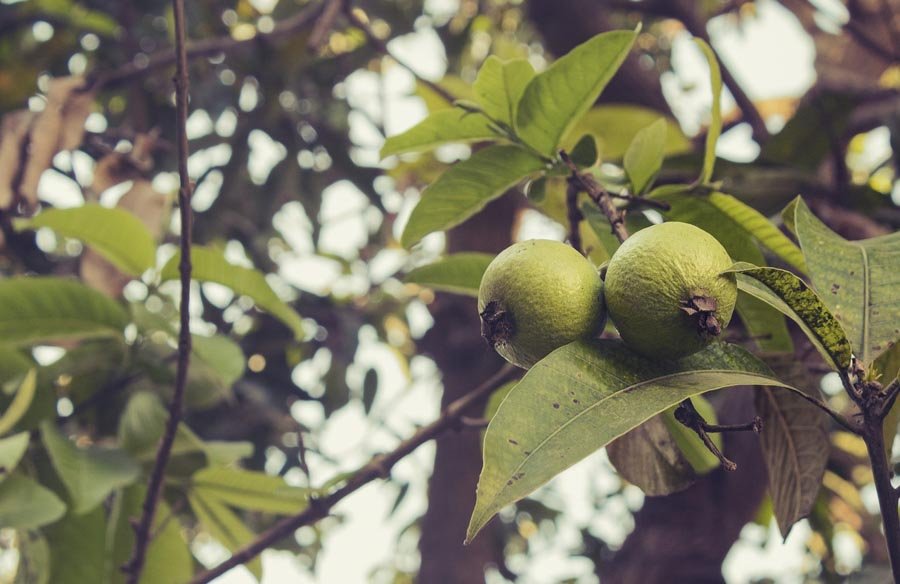
16. Guava fruit
For a tropical fruit, guavas can be a healthy and beneficial part of a diabetes-friendly diet when eaten in appropriate portions.
. Here’s why:
Low Glycemic Index
Guavas have a low to moderate glycemic index (GI) of around 50, meaning they have a relatively mild effect on blood sugar levels. This makes them a suitable fruit option for diabetics.
High Fiber Content
Guavas are rich in dietary fiber, particularly in the seeds and skin. Fiber helps slow the absorption of sugar into the bloodstream, which can help prevent spikes in blood sugar levels and improve overall glycemic control.
Rich in Vitamins and Minerals
Guavas are packed with essential nutrients such as vitamin C, vitamin A, potassium, and folate. These nutrients support overall health and can help manage diabetes-related complications.
Antioxidant Properties
Guavas are high in antioxidants, including vitamin C and various phytochemicals. These antioxidants help reduce oxidative stress and inflammation, which can be particularly beneficial for diabetics.
Low in Calories
Guavas are relatively low in calories, making them a healthy snack option that can aid in weight management. Maintaining a healthy weight is important for managing diabetes effectively.
Hydration and Satiety
Guavas have a good water content, which helps keep you hydrated and promotes a feeling of fullness. This can help prevent overeating and support weight management.
Potential to Improve Digestion
The high fiber content in guavas supports digestive health by promoting regular bowel movements and preventing constipation. A healthy digestive system can contribute to overall well-being and better diabetes management.
Natural Sweetness
Guavas offer natural sweetness, which can satisfy cravings for sweets without the need for added sugars. This can help diabetics manage their sweet tooth in a healthier way.
Portion Control
As with any fruit, it’s important for diabetics to monitor portion sizes due to the natural sugar content. Incorporating guavas into a balanced diet while keeping an eye on overall carbohydrate intake can be a tasty and nutritious way to support diabetes management.
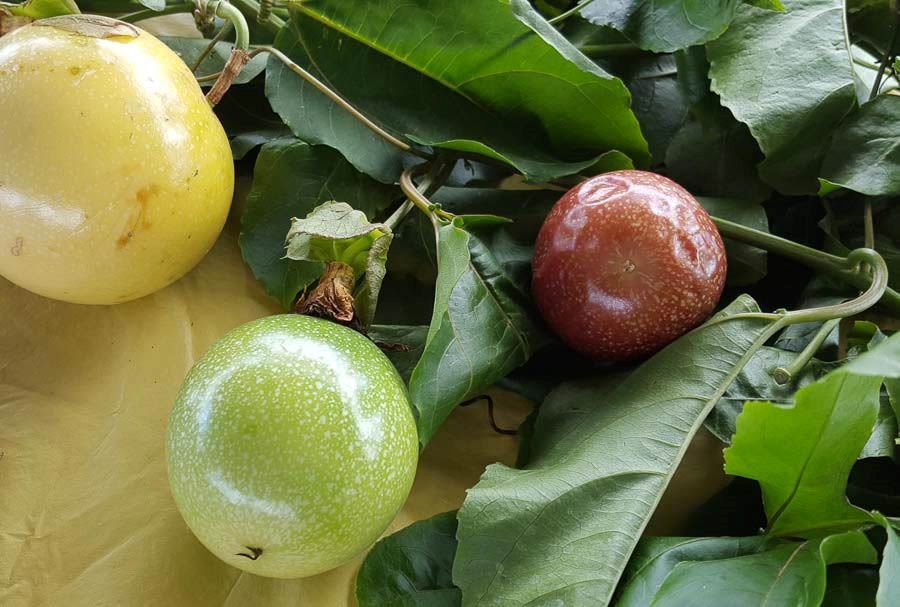
17. Passion fruit
Incorporating passion fruit into a balanced diet, while being mindful of portion sizes and overall carbohydrate intake, can be a flavorful and nutritious way to support diabetes management. Here’s why passion fruit can be a good choice:
Low Glycemic Index
Passion fruit has a low glycemic index (GI) of around 30-40, which means it has a relatively minimal impact on blood sugar levels. This makes it a suitable fruit option for diabetics.
High Fiber Content
Passion fruit is rich in dietary fiber, especially in the seeds. Fiber helps slow the absorption of sugar into the bloodstream, which can help prevent spikes in blood sugar levels and improve overall glycemic control.
Rich in Vitamins and Minerals
Passion fruit is packed with essential nutrients, including vitamin C, vitamin A, and potassium. These nutrients support overall health and can help manage diabetes-related complications.
Antioxidant Properties
Passion fruit contains antioxidants like vitamin C and beta-carotene. These antioxidants help reduce oxidative stress and inflammation, which are often elevated in diabetics.
Low in Calories
Passion fruit is relatively low in calories, making it a healthy snack option that can aid in weight management. Maintaining a healthy weight is important for managing diabetes effectively.
Hydration and Satiety
Passion fruit has high water content and a unique texture that can promote a feeling of fullness. This can help prevent overeating and support weight management.
Natural Sweetness
Passion fruit offers a naturally sweet and tangy flavor, which can satisfy cravings for sweets without the need for added sugars. This can help diabetics manage their sweet tooth in a healthier way.
Portion Control
While passion fruit has health benefits, it’s still important for diabetics to monitor portion sizes due to its natural sugar content. Consuming it as part of a balanced diet can help manage blood sugar levels effectively.
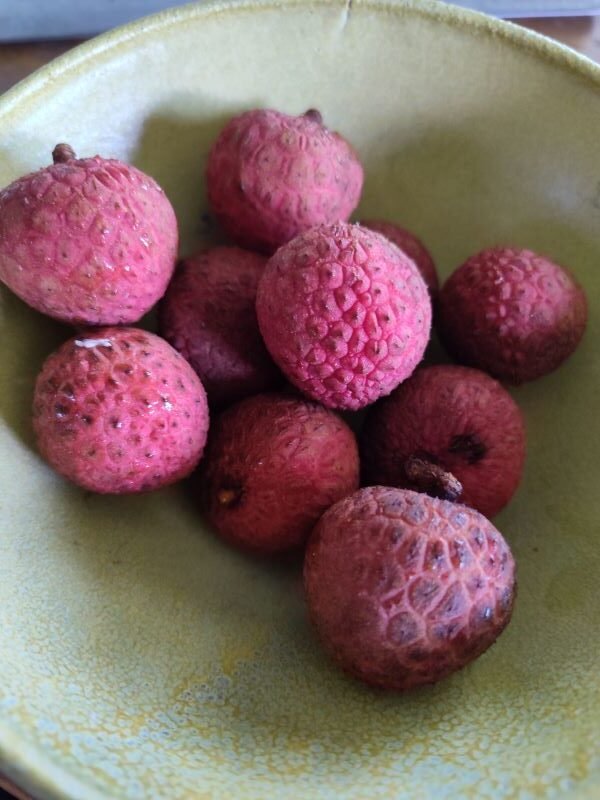
18. Lychee fruit
Lychee can be eaten by diabetics, but it should be consumed with caution due to its natural sugar content. Here’s a breakdown of why it can be both beneficial and why it requires moderation:
Glycemic Index
Lychee has a moderate to high glycemic index (GI), generally around 50-60. This means it can have a more significant effect on blood sugar levels compared to fruits with a low GI. Therefore, portion control is essential.
Natural Sugar Content
Lychees are relatively high in natural sugars, which can impact blood sugar levels. Diabetics should be mindful of their portion size to avoid excessive sugar intake.
High in Vitamin C
Lychee is an excellent source of vitamin C, which supports immune function and overall health. Vitamin C can help manage diabetes-related complications by reducing oxidative stress.
Rich in Antioxidants
Lychee contains antioxidants such as flavonoids and polyphenols, which can help reduce inflammation and oxidative stress, which are often elevated in diabetics.
Low in Calories
Lychee is relatively low in calories, which can make it a better option for those managing weight as part of their diabetes care plan.
Hydration and Fiber
Lychee has a high water content, which helps with hydration. However, it is lower in dietary fiber compared to some other fruits. Fiber helps in managing blood sugar levels, so it’s beneficial to balance lychee with other high-fiber foods.
Portion Control
Given its sugar content and GI, it’s important for diabetics to eat lychee in moderation. A small serving can be included as part of a balanced diet, but it should not be consumed in large quantities.
Balanced Diet
Incorporating lychee as part of a varied diet that includes low-GI fruits, vegetables, and other nutrient-dense foods can help manage blood sugar levels effectively.
Conclusion to healthy fruits for diabetics
As you can see there are a lot of healthy fruits you can eat as a diabetic that is enriched with vitamins but also has minimal sugars to prevent any spike of your blood glucose levels. So you should always keep a stock of these fruits available to eat raw or to use an ingredient for a finished dish.
Thanks for checking out Beat Diabetes Guide.com, we hope this recipe and others have inspired you to try making this delicious breakfast blueberry muffin, please do share this with any of the social media buttons below and share with your friends.
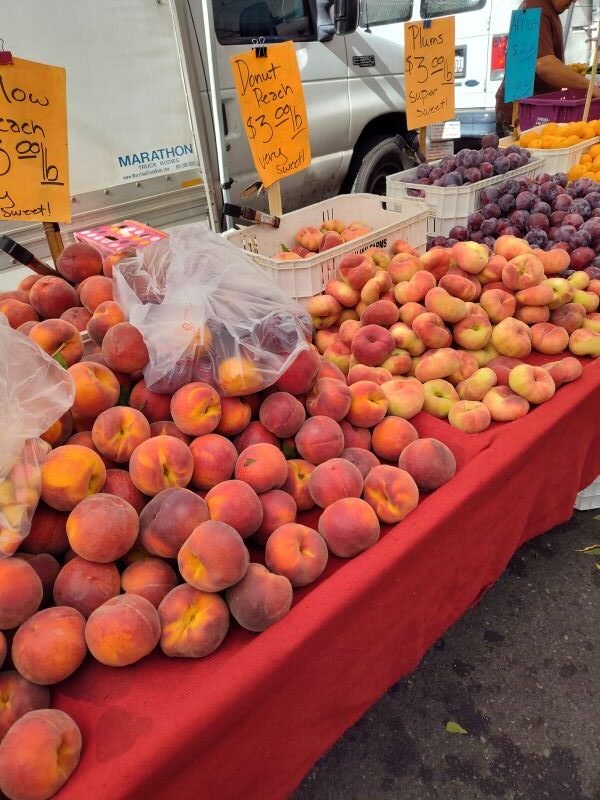
4 thoughts on “Best fruits to eat for diabetics”
Comments are closed.